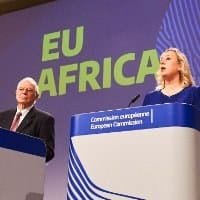(BRUSSELS) – The EU’s foreign policy chief and the Commission set out the basis for a new, ‘green’ strategy with Africa, focusing on green and digital transformation, as well as promoting sustainable investment and jobs.
A new Communication sets out proposals to intensify cooperation through partnerships in five key areas: green transition; digital transformation; sustainable growth and jobs; peace and governance; and migration and mobility.
The EU executive says the document offers the basis for Europe to engage in discussions with African partners towards a new joint strategy to be endorsed at the European Union – African Union Summit in October 2020.
“A part of Europe’s future is at stake in Africa,” said foreign policy chief Josep Borrell: “To face our common challenges, we need a strong Africa, and Africa needs a strong Europe. There is everything to gain from reinforcing our already very strong partnership in areas such as peace and stability, poverty and inequalities, terrorism and extremism.”
“With the proposed five partnerships, built around our shared interests and values, Africa and Europe will together lead on the green and digital transformation, as well as promote sustainable investment and jobs,” said Commissioner Jutta Urpilainen.
The renewed cooperation on the partnerships around the five areas proposed today will build on an ongoing dialogue with African partners, which will be taken forward ahead of the next EU-AU Summit in Brussels in October 2020 in view of defining joint strategic priorities for the years to come.
The proposals set out build on a growing momentum in EU-Africa relations. With the 6th Summit between the African Union and the EU and the conclusion of the negotiations of the new partnership agreement between the EU and the African, Caribbean and Pacific group of States, 2020 will be a pivotal year in living up to our ambition of an even stronger partnership with Africa, our natural partner.
The partnership should be based on clear understanding of our respective and mutual interests and responsibilities.
The Communication proposes that the EU partners with Africa on the following actions:
- Maximise the benefits of the green transition and minimise threats to the environment in full compliance with the Paris Agreement
- Boost the continent’s digital transformation
- Substantially increase environmentally, socially and financially sustainable investments that are resilient to the impacts of climate change; promote investment opportunities by scaling up the use of innovative financing mechanisms and boost regional and continental economic integration, particularly through the African Continental Free Trade Agreement
- Attract investors by supporting African states in adopting policies and regulatory reforms that improve the business environment and investment climate, including a level-playing field for business
- Rapidly enhance learning, knowledge and skills, research and innovation capacities, particularly for women and youth, protecting and improving social rights, and eradicating child labour
- Adapt and deepen EU support to African peace efforts through a more structured and strategic form of cooperation, with a particular focus on regions where vulnerabilities are the highest
- Integrating good governance, democracy, human rights, the rule of law and gender equality in action and cooperation
- Secure resilience by linking humanitarian, development, peace and security interventions at all stages of the cycle of conflicts and crises
- Ensure balanced, coherent and comprehensive partnerships on migration and mobility
- Strengthen the international rules-based order and the multilateral system, with the United Nations at its core
Link to full text of the Joint Communication
Towards a Comprehensive Strategy with Africa - background guide


